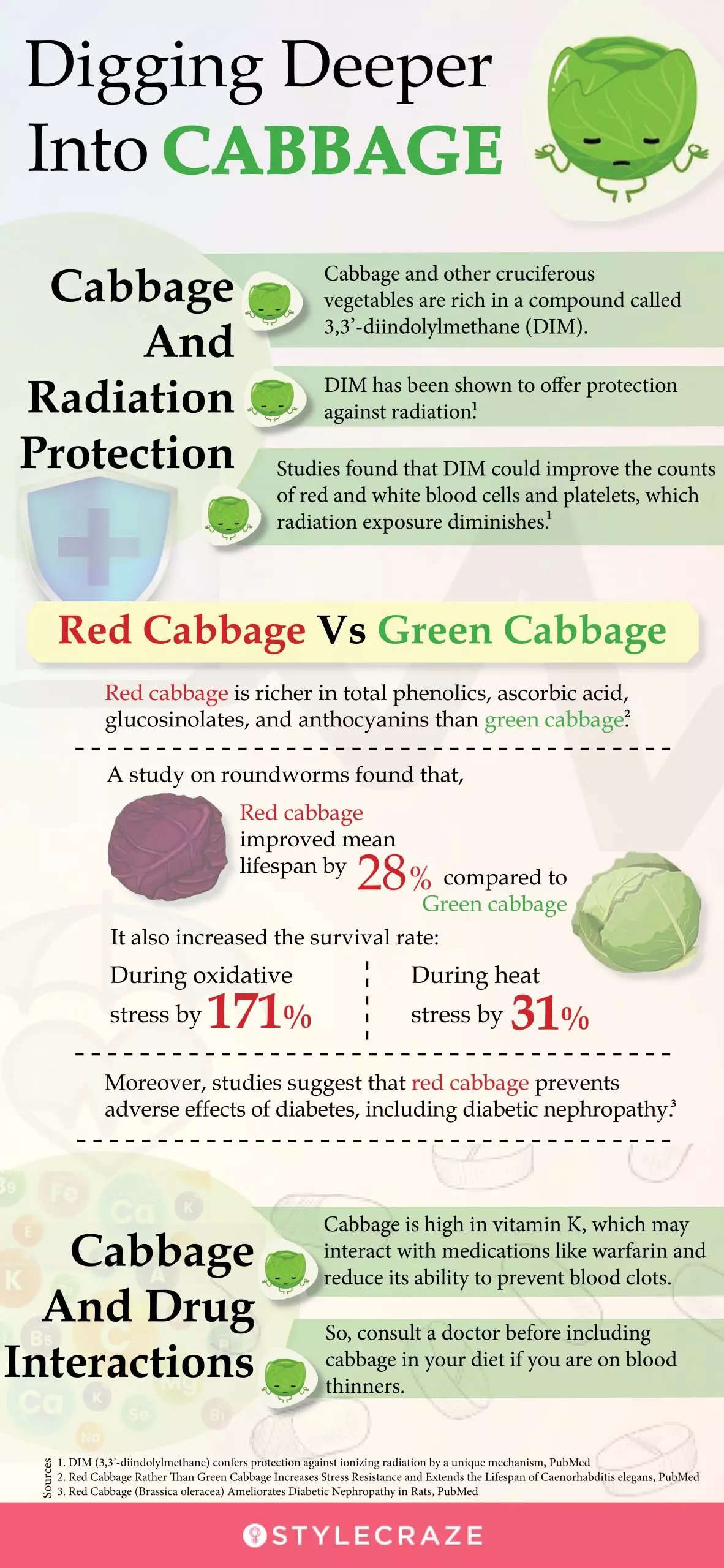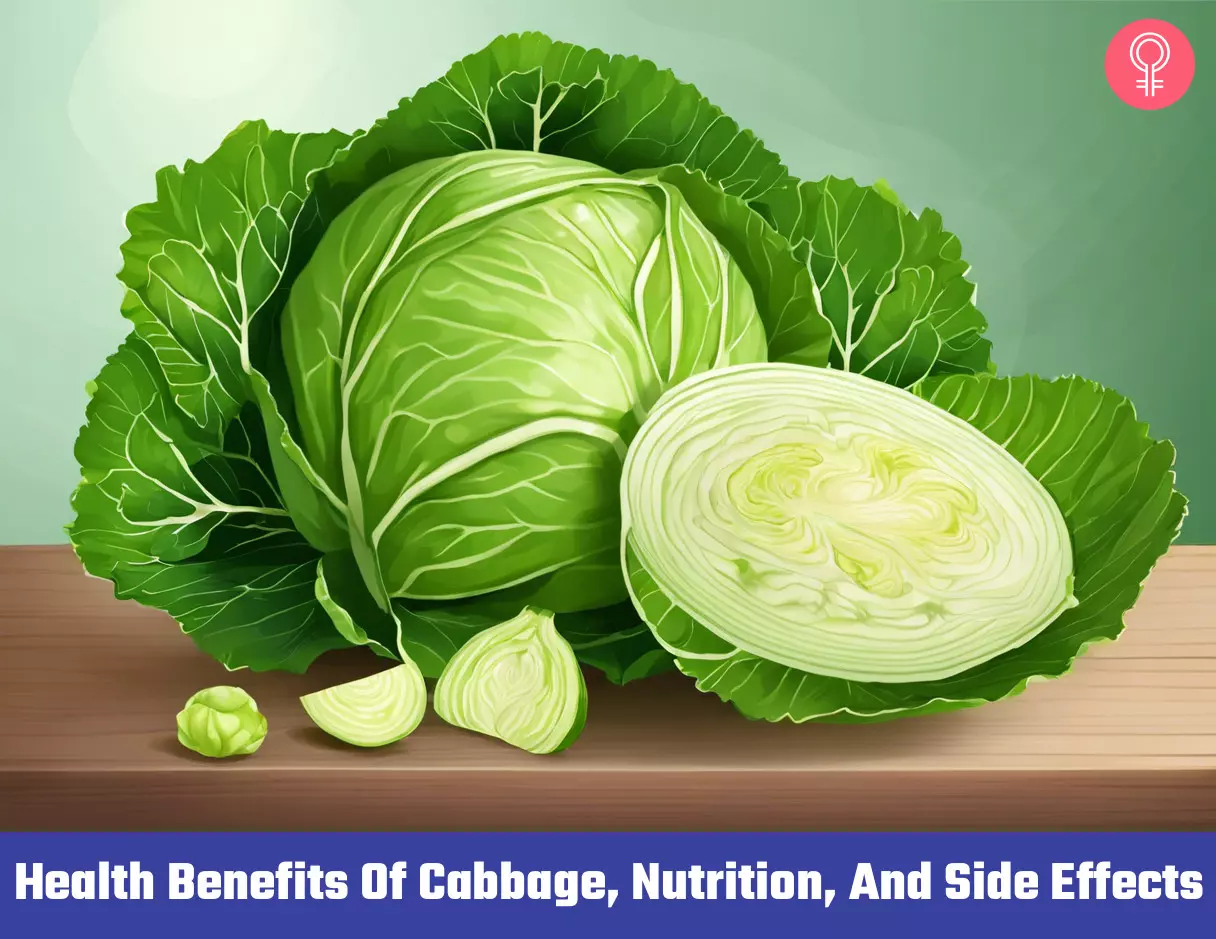The intake of cabbage can help promote heart health, enhance the digestive system’s functioning, fight inflammation, and offer protection against cancer. In this article, we have discussed the health benefits of cabbage, its nutrition profile, how to include it in your diet, and its possible side effects. Keep reading!
How Is Cabbage Good For You?
Cabbage contains four major antioxidants. These are choline, beta-carotene, lutein, and quercetin. Who Can Consume It? Anyone can consume it except people with a cabbage allergy and hypothyroidism and those on diabetes and blood thinning medications. How Often? You can consume 1 cup of cooked cabbage daily. Caution Avoid consuming cabbage if you are pregnant or lactating. Excess consumption may cause very low blood sugar and increase the risk of foodborne illnesses. Choline can improve memory and brain function and fight inflammation. It can also prevent neural tube defects in pregnant women (1). Beta-carotene protects the human DNA from the ill effects of smoking (2). Lutein can prevent age-related macular degeneration (3). Quercetin fights harmful bacteria and combats disease (4). Cabbage is also rich in vitamins C and K, and B vitamins that offer plenty of other benefits. Cabbage is available in different varieties, including:
Cannonball cabbage (also called green cabbage, the most common variety) Bok choy Choy sum Napa cabbage Savoy cabbage Red cabbage
No matter the variety, the benefits are similar. Cruciferous vegetables, in general, are one of the most researched food groups. Cabbage happens to be among the popular ones. The following section will shed more light on how including cabbage in your regular diet may benefit you.
How Does Cabbage Benefit You?
Cabbage is rich in various antioxidants, including anthocyanins and sulforaphane. These help fight inflammation and the associated ailments like heart disease and cancer. Fermented forms of cabbage may also boost your digestive health.
1. May Promote Heart Health
Red cabbage is rich in anthocyanins (5). These compounds are responsible for its characteristic red color. Studies link anthocyanins to a reduced risk of heart disease, though more long-term research is warranted (6). A high intake of anthocyanins may also reduce the risk of myocardial infarction in young and middle-aged women. Further trials should give us more information on this aspect (7). These anthocyanins may also lower arterial stiffness, potentially reducing blood pressure (8). The benefits of sauerkraut are well known. It is used in fermented cabbage preparation and it also promotes heart health (9). It is believed that sauerkraut neutralizes the gut flora, whose chemical by-products could harden the arteries. However, more research is needed to establish this connection. Red cabbage also protects the heart by reducing the levels of bad cholesterol in the body (10).
2. May Enhance Digestive Health
Kimchi, another fermented food prepared from cabbage, can promote digestive health. It is rich in probiotics and promotes digestion in ways similar to yogurt and other dairy products. Kimchi prevents constipation and also promotes colorectal health (11). Cabbage is also rich in both insoluble and soluble fibers. The former adds bulk to stools and promotes regularity (12). The latter promotes gut-friendly bacteria (13).
3. May Fight Inflammation
Though inflammation by itself is not bad, chronic inflammation is. Cruciferous veggies, like cabbage, fight chronic inflammation (14). In a study, women who had the highest intake of cruciferous vegetables displayed the lowest levels of inflammation. The study partly links the intake of such vegetables to reduced inflammation (15). This can be attributed to an antioxidant called sulforaphane present in cruciferous vegetables (16). Sulforaphane may also slow down cartilage damage in joints (17). In another study, cabbage leaf wraps helped relieve inflammation of the knee in patients with osteoarthritis. They could be recommended for those with knee osteoarthritisi A condition in which the cartilage cushioning the end of the bone wears down over time and causes joint pain. , though more research is warranted (18). Cabbage phytochemicals can also help fight health problems related to inflammation, including cancer and coronary artery disease (clogged Arteries) (19).
4. May Offer Protection From Cancer
Research is ongoing on the anticancer effects of sulforaphane. At the molecular level, this antioxidant has shown promising results (20). Cabbage also contains another set of compounds called isothiocyanates. These may disarm carcinogens by getting them out of their toxic states and flushing them out of the body (21). Cabbage contains another compound called brassinin, which also exhibits chemopreventive activity (22). In rat and mouse studies, compounds in cabbage (cruciferous vegetables, in general) could inhibit the development of cancers of the bladder, breast, colon, liver, stomach, and lung (23), (24).
5. May Aid Diabetes Treatment
The benefits of red cabbage are widely recognized. It has antihyperglycemici A class of drugs commonly used in the treatment of diabetes to lower blood glucose levels in the blood. properties, which can cut the risk of diabetic nephropathyi Generally a complication of diabetes, it is the deterioration of the kidney function. It can even cause kidney failure. (25). Red cabbage extract also shows promise in alleviating diabetes and its vascular complications (26). In a study, oral administration of cabbage extracts lowered blood sugar levels in fasting rabbits and relieved diabetic symptoms in depancreatized dogs (27). The anthocyaninsi Colored water-soluble pigments that belong to a class of phenolic groups. They are rich in antioxidant properties. in cabbage could also have a role in treating (and even preventing) diabetes (28).
6. May Promote Vision Health
The lutein in cabbage contributes to vision health. Lutein (along with another antioxidant called zeaxanthin) protects the retina and the lens against the ultraviolet light. Cabbage also contains trace amounts of zeaxanthin (29). Cabbage also contains vitamin C, another nutrient that aids vision. It may regenerate vitamin E inside the eye, which is an antioxidant important for vision health (30).
7. May Strengthen Immunity
The vitamin C in cabbage could strengthen immunity, though more studies are needed to further validate this statement (31). The antioxidant stimulates the white blood cells that help form the first line of defense. It also promotes the maturation of T-cells, which are an important component of the body’s immune system (32).
8. May Help With Weight Loss
Fruits and vegetables containing fiber (including cabbage) can help with weight loss (33). Some individuals also believe in a particular weight loss diet made of cabbages, called the cabbage soup diet. This diet involves the intake of large amounts of cabbage soup for seven days. You may also consume certain other fruits and veggies, brown rice, chicken, and beef. Though proponents say it is a good way to lose a few pounds quickly, you shouldn’t be staying on it for more than a week because it lacks in complex carbohydrates, protein, and other vitamins and minerals (34).
9. May Lower Blood Pressure
Cabbage is a good source of potassium, a vital mineral, and electrolyte important for several bodily functions. Potassium helps excrete excess sodium through urine (35). It may also help widen the blood vessels, which may lower blood pressure levels (36). Potassium from fruits, vegetables, and low-fat dairy products may also help in lowering systolic blood pressure by an average of 5.5 mmHg and diastolic blood pressure by 2.88 mmHg. According to the FDA, following a healthy diet or the DASH eating pattern focusing on potassium-rich foods and low-sodium foods may help reduce the risk of high blood pressure and stroke (37).
9. May Improve Skin Health
Cabbage is rich in vitamin C. This nutrient boosts the production of collagen, a structural protein that helps with skin formation and wound healing (38). As per mice studies, red cabbage may also have a role in skin cancer prevention (39).
11. Might Strengthen Hair
Cabbage contains quercetin. This antioxidant shows some promise in the treatment of alopecia areata (an autoimmune condition involving sudden hair loss). Mice studies show that subcutaneous injections of quercetin may induce hair growth in preexisting alopecic lesionsi An abnormal change in the tissue inside or outside the body which may have been caused by damage or trauma. (40). We need more research in this regard, though. Of course, the studies have been promising. But we are yet to see how effective the quercetin in cabbage can be in boosting hair growth in humans. The above benefits can undoubtedly be attributed to the powerful nutrients present in cabbage. Let’s take a look at its nutritional profile.
What Is The Nutrition Profile Of Cabbage?
Values sourced from USDA, cabbage, raw Including cabbage in your regular diet is one way of benefiting from these nutrients. In the following section, we will discuss how you can do that.
How To Include Cabbage In Your Diet
The first thing to do is pick the right cabbage. You need to choose one that is heavy for its size. Also, ensure the leaves are tight and firm. Loose leaves indicate the cabbage is older. You can eat this veggie raw, boiled, steamed, roasted, stuffed, or even sautéed. Don’t overcook cabbage as doing so leads to the characteristic sulfur-like odor. Following are the ways you can include cabbage in your diet:
Add shredded cabbage to your evening vegetable salad. Add chopped cabbage to the soup you have for dinner. Drizzle roasted cabbage with powdered black pepper, olive oil, and minced garlic and have it as it is.
Wendy, a food blogger, explains how she became a fan of cabbage after trying the lemongrass and cabbage soup and shares the recipe on her blog. The familiar dishes she made with cabbage included sauteed with bacon, rosemary lamb, or coleslaw. She wrote, “Just recently I started making this wonderfully fragrant, creamy soup. It looks pretty and it tastes fresh and healthy. I adore it. So much so, in fact, that the cabbages in my kitchen don’t often make it through the weekend (i).” Eating raw cabbage can offer the greatest amount of nutrients, followed by fermenting and cooking. Plan your cabbage meals accordingly. But before you do that, you should know the possible side effects of cabbage.
What Are The Side Effects Of Cabbage?
Consuming cabbage can have various advantages, but they also come with side effects. They can cause allergic reactions to other serious issues in the body. Let’s look at how the negative effects of cabbage on ladies and gents are caused.
Possible Issues During Pregnancy And Breastfeeding
Avoid eating raw cabbage to cut the risk of food-borne illness (41). Ensure you cook cabbage properly before consumption.
Allergies
If you are allergic to other veggies from the cabbage family (like broccoli or cauliflower) (42), stay away from cabbage.
May Lower Blood Sugar Way Too Much
If you are already on diabetes medication, do check with your doctor before you start consuming cabbage (43). This is to ensure your blood pressure doesn’t go way too low.
Hypothyroidism
Cabbage may interfere with the thyroid hormone. If you have hypothyroidism, cut back (or even avoid) cabbage. This is truer with raw cabbage. Consult your doctor too (44). How to store cabbage? Wrap cabbage tightly in plastic wrap (if it is already cut) or in a sealable plastic bag (if it is whole). You can store the cabbage in the crisper draw in your refrigerator for up to 2 to 3 weeks. Is cabbage keto? Since cabbage is comparatively low in carbohydrates, it can be a part of your keto diet. Is cooked cabbage is good for you? Eating raw or lightly cooked cabbage is good for health. Cooking cabbage at high temperatures for long periods destroys the active enzymes in it. Is cabbage healthier than lettuce? In terms of proteins and vitamins, cabbage is healthier than lettuce. A regular serving of cabbage meets 60% of the RDA of vitamin C intake, while lettuce only meets about 4% of the RDA of the vitamin (45), (46), (47). Cabbage also contains vitamin B6, while lettuce does not. Hence, cabbage could be a healthier option than lettuce. Is cabbage water healthy? Yes, cabbage water is healthy. Vitamins E and C in the vegetable can stimulate the digestive and immune systems. Drinking cabbage water is linked to many benefits, including weight loss, improved gut health, decreased inflammation, balanced hormones, and body detoxification. However, none of them have been scientifically proven. How long does it take cabbage juice to heal an ulcer? On average, cabbage juice can heal ulcers after 7-10 days of treatment. In one study, 13 participants with stomach and upper digestive tract ulcers were given around one quart (946 ml) of fresh cabbage juice throughout the day (48). What are the possible issues of eating cabbage during surgery? Cabbage may affect blood sugar control during and after surgical procedures. Avoid eating it at least two weeks before a scheduled surgery. Can you eat cabbage at night? Cabbage is high in fiber content and may be difficult to digest for some people. Therefore, it is not recommended to eat it at night. Is cabbage good for wrinkles? Cabbage is loaded with antioxidants, which may have anti-aging benefits. Anecdotal evidence suggests that cabbage juice works as a remedy for under-eye wrinkles. Does cabbage block iron absorption? No, cabbage does not block iron absorption. On the contrary, it contains high quantities of vitamin C, which aids in iron absorption.
Illustration: Health Benefits Of Cabbage Nutrition And Side Effects
Discover the amazing health benefits of cabbage and how to add it to your diet from a doctor in this informative video. Watch the video to learn how this vegetable can help improve your overall health and wellbeing.












